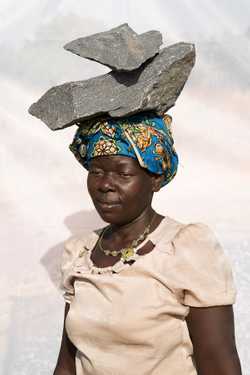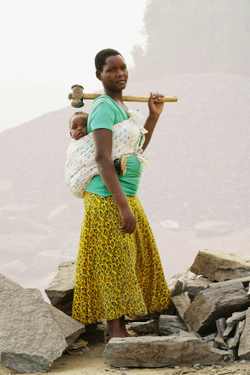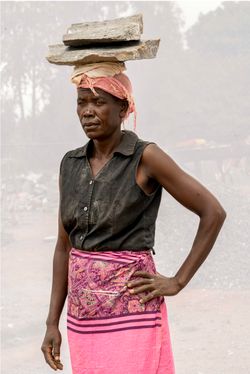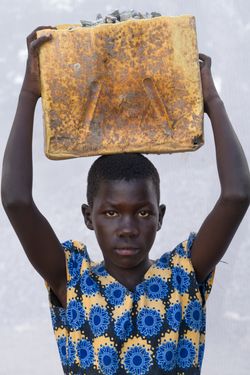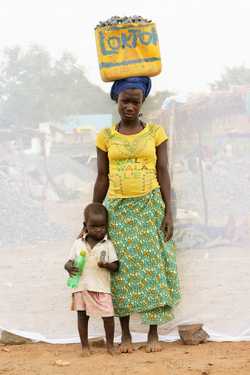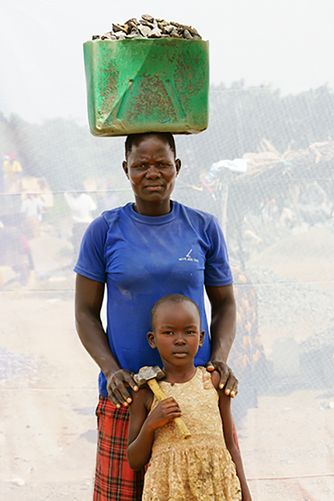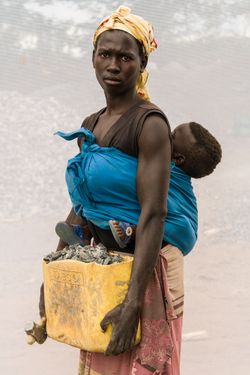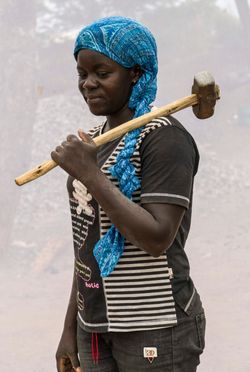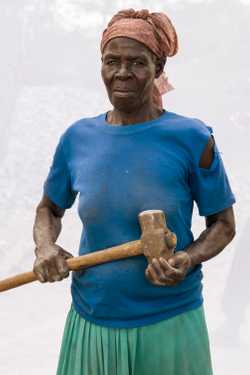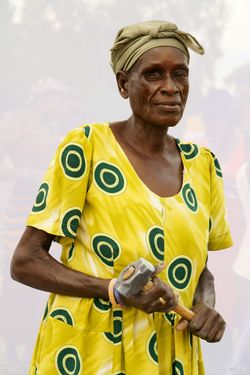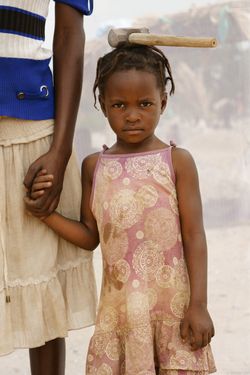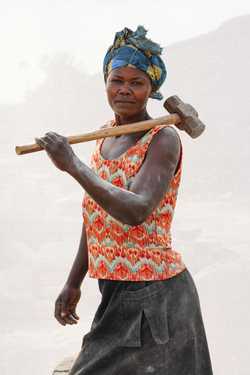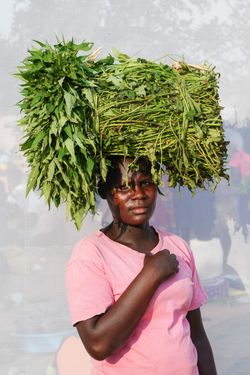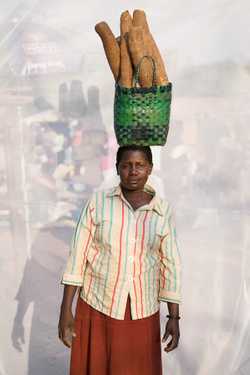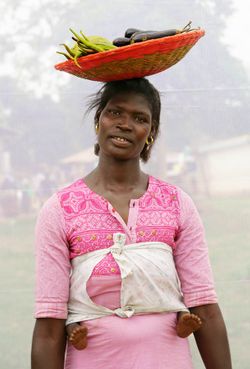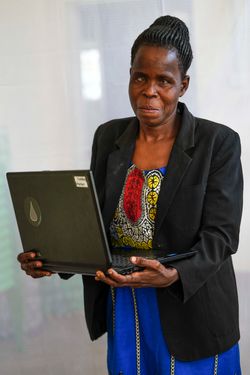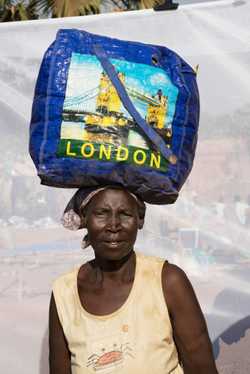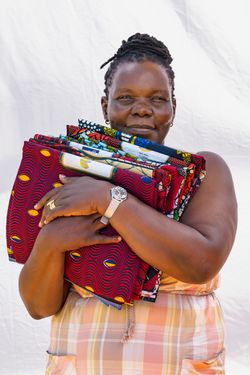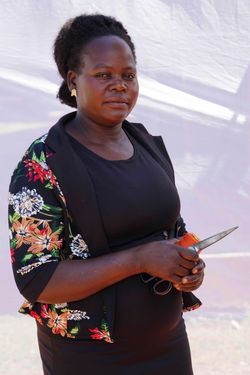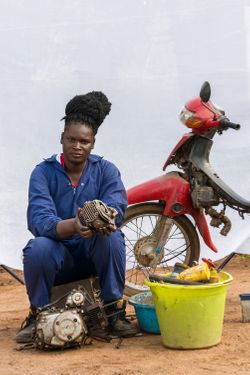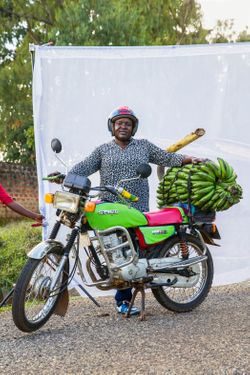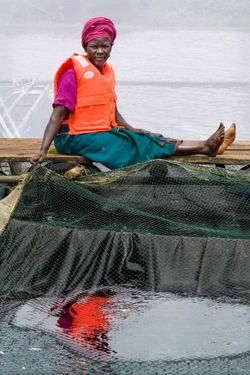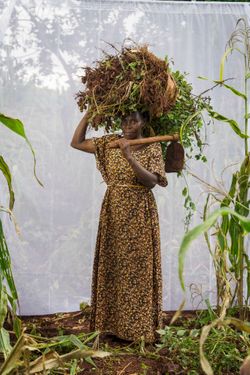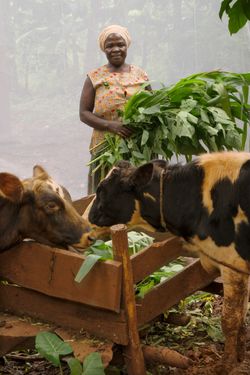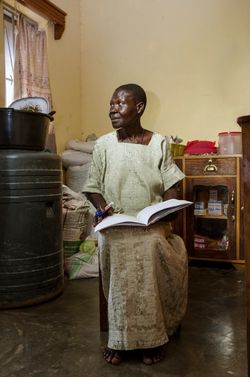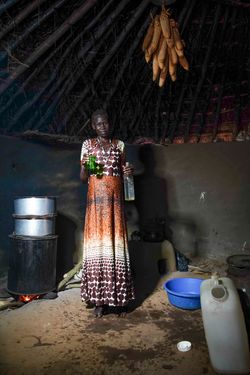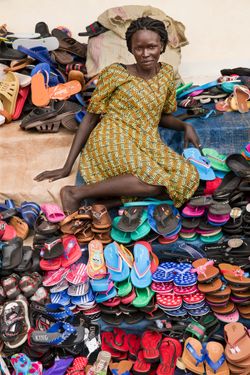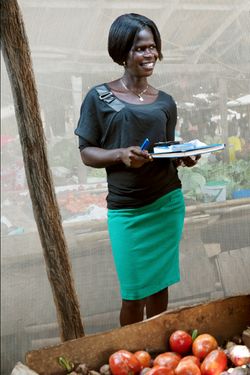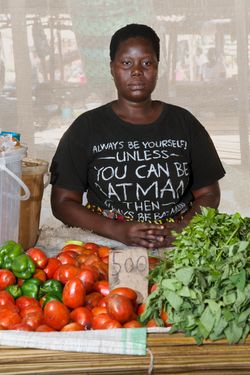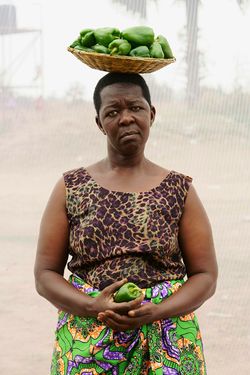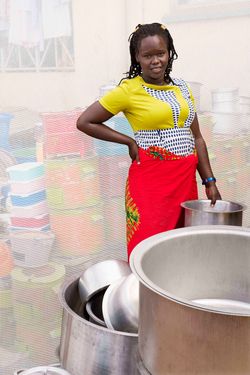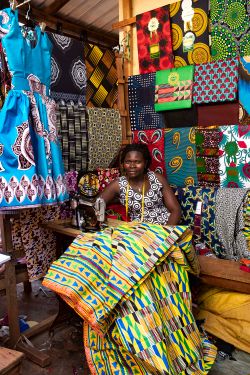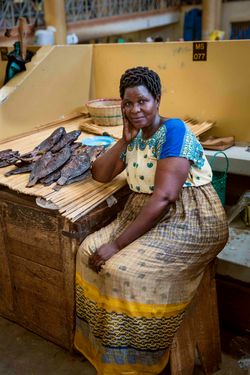HER STORY
ABUR JENNIFER: AGE 38 WORKING IN QUARRY FOR 10 YEARS. BREAKING STONES TO GRAVEL SIZE, FILLING 10 JERRYCANS OF GRAVEL PER DAY AT 1,000 UGX PER ($0.32 USD)
I was born in 1983, and I have eight children, including a three-month-old baby, and I have one grandchild. Two of my children are now casual laborers, and the rest are in school. Three weeks after having my last child, I brought him along with me to the quarry. The other younger ones are taken care of by the older children.
My husband was a Boda-boda driver, but he got involved in a Boda-boda accident two years ago, and his leg was amputated. These days, he mainly sits under a mango tree.
I have now taken the husband role and must provide everything. I hope that my husband could get a donation of an artificial leg so that he can make some contributions at home.
My father died when I was six months old, and my mother left home, and my grandmother took care of me. I started working at the age of ten, hawking vegetables because I needed to earn some money and help my grandmother. I met my mother at the age of fifteen after I had had my first child, but we have not bonded, and we are not really close.
I have been working at the quarry for ten years. I used to assist other women until I managed to save 20,000 shillings, and I bought my rock, and I started crushing. From there, I was able to rent my space, pay for membership and a license.
I buy food for home, and I pay school fees for my children. But money is never enough to pay for everything. I sell a jerrycan of rocks at 1,000 shillings. Sometimes I can make about 20,000 shillings a day, but sometimes the trucks don’t come, and that means there will be no money for food or school fees. The work here is not as easy as it used to be many years ago. There were rocks everywhere, and we would simply crush them, but now more people have joined, and the rocks have become scarce. The quarry is filled with water, and only strong men can dig them out, and we must buy from them.
My dream is to start a second-hand clothes business. I would like to rest from this hard work. I don’t want the hard work anymore. Sometimes I hurt my hand or my fingers, and I must stay home without working. But with selling second-hand clothes, I will not get injuries.
I am now the husband in this home, and I have to do whatever I can to keep this house standing.
DONG INNOCENT: AGE 19 AND HER SON MICHAEL AGE 14 MONTHS HAVE WORKED IN QUARRY FOR ONE YEAR. BREAKING STONES TO GRAVEL SIZE, FILLING 10 JERRYCANS OF GRAVEL PER DAY AT 1,000 UGX PER ($0.32 USD)
I'm a mother of three children; a four-year-old girl, a two-year-old girl, and a nine-month-old boy. I start working at the quarry at the age of 17 because I live close by.
In school, I loved storytelling, and English was my favorite subject. Unfortunately, my parents didn’t have a good relationship. They were often fighting, and my mother decided to move back with her family in Parabongo. Then things became more difficult, and that is why I dropped out of primary six and started doing casual work in the village. I started farming mainly rice and groundnuts. That is what we are doing for a while.
I want to start a small business selling second-hand clothes so that I begin to start paying school fees for my children, and hopefully, one day, I will buy a big chunk of land for farming. There isn't much money in circulation, and very little is coming towards me.
ICAN ALICE: AGE 40 WORKING IN QUARRY FOR SEVEN YEARS, BREAKING STONES TO GRAVEL SIZE.
I have been hitting stones in the quarry for seven years. Two of my son's wives have left them, so I am taking care of three of their children who are under the age of five. I raise them, along with my five children. My last child is thirteen years old and is in school.
I have no shelter, so I have my makeshift cover, which protects me from sunshine but not heavy rain. Sometimes we run to the shops when the rain starts, sometimes it rains on me. As for the hot sun, I no longer mind it; it's the rains that really makes my work so difficult.
This job isn't easy. You must have serious needs to do it. I have nowhere to turn. This is my job until I find something easier to do. I have been hoping for a long time to save some money so I can start a second-hand clothes business, but the problem of the stomach (hunger) must be solved first, and then there are school fees, and then there are daily needs, and then I just keep working here for years.
My children sometimes come to assist me with my work. They are not allowed here. The rules don't accept that. They come during the holidays, and we work together. It's better when I get some help. I need it. I constantly have chest pains, and each time I explain to the medical personnel, they tell me, "it's the work that I do that causes chest pain," yet no one offers to me long term solutions. I want to heal. I don't want to have any pain, but my work, for now, comes along with bodily harm. A friend of mine, some gravel hit her eye, and she needs surgery, but she doesn't have the money. This is how sometimes it is. You get hit, and you can't find a cure for your pain.
ABER JOVIA: AGE 10 WORKING IN QUARRY FOR FOUR YEARS TO EARN MONEY FOR SCHOOL FEES
I am in Primary Four. I am usually second in my class, and my favorite subject is English. I work in the quarry on Saturday and Sunday. I earn 5,000 shillings per day, and I use that money to pay for my school fees and buy my school supplies.
Sometimes, my mother borrows my money, and she doesn’t pay back.
I want to be a doctor so I can help people.
ACAN CATHERINE: AGE 27 & HER DAUGHTER PATIENCE: AGE 4. WORKING IN QUARRY FOR 10 YEARS. PATIENCE HELPS HOWEVER SHE CAN
I am a mother of one child, a five-year-old girl. I was born and raised in Kanene Village.
I dropped out of primary four because of a lack of school fees. I learned how to plait hair from a friend. These days I plait here at the trading center. I am a firstborn of eight children, and I am taking care of all these children. The young ones, their ages range between four and six years. Right now, everything hinges on me. I provide food; I bathe the children; I take them to hospitals. I do everything to make sure that they have a good life.
My mother left my father because he is a drunkard and doesn't contribute much to the running of the home.
No one helps me, pays school fees for my siblings, or helps me teach them. I used to work in this Quarry, but I stopped since some young boys chased after me one evening. I run, and they run after me, and after they run after me, I was lucky when a Boda-boda rider let me jump on his bike, and he took me close to home. I think the boys had always monitored my movements in the evening and wanted to harm or rape me.
I now work in the Quarry near home, but it doesn't have many people, and buyers hardly come to pay for aggregates. Since the quarry is nearby, I first tend to the garden before going there to work.
I started working at the Quarry at the age of eight by crushing other people’s gravel. Then I got my own space, and I would get my own gravel, crush and then sell.
One time, I fell close to the hole that have been created by years of excavation. I was young, and children are not allowed to work at the Quarry, but no one really checks. A local leader called to check the situation and to speak to my parents. When the leader came home and saw the state my father was in, he left silently, and the next time he saw me, he asked me to crush gravel instead of carrying them.
He saw the sorry state of our home, and maybe he understood why I needed to work there, given the risks.
I would like to start my own salon so that I can plait hair and make women beautiful. It will be easier to work on my body.
ACIRO VICKY: AGE 18 WITH HER SON MICHAEL (AGE 10 MONTHS) WORKING IN QUARRY FOR ONE YEAR
I was raised by my maternal aunt because my parents died when I was young. I don’t even remember their faces. I can only imagine stories about them, and sometimes, I wonder if they loved me and how life would have been with them.
I was married off at the age of fifteen, so I never really had much of an education. I dropped out in primary four because of a lack of school fees. I can write my name, count money, but that is basically all I know.
I wanted to be a doctor, but that is not possible now. I can only continue to admire the doctors and enjoy the work that they do.
I dream of a time when I will have my own shop where I can sell whatever I want, and I don’t have to move around or share space with so many people like here in the quarry. I am eighteen, and I hope that I will be able to do this.
GLADYS LAKARABER: AGE 22 WORKING IN QUARRY FOR THREE YEARS
I have studied up to Senior Three, and then my father said he didn’t have money to pay my school fees anymore, so I couldn’t study anymore. I stayed home for a while. Then he got some money, and I studied hairdressing, but I don’t have the capital to start a salon. My father is a subsistence farmer.
I came to work here because my mother works here. She showed me what to do and guides me on what to do here. I use her space.
Sometimes, the trucks don’t come to buy the gravel, and that means we don’t earn any money. We get wet every time it rains here because we don’t have any shelter. Sometimes, I try to outrun the rain so I don’t get so wet.
I want to become a teacher when I get enough money to pay school fees.
ACAN CHRISTINE: AGE 35 WORKING IN QUARRY FOR 17 YEARS
I am a mother of four children. My husband is a farmer. I was born and raised in Madi Opei village in Lamwo District.
LRA rebels abducted me when I was ten years old. We used to sleep in the bush before the rebels abducted me, but when we returned home in the morning about 8 am, they were waiting for my family at home. They took only me and left the rest of my family at home. I lived with rebels in the bush for two years carrying luggage, cooking, walking long distances, sometimes forced to fight government soldiers. Sometimes, I wonder how I survived. When I got home, I found out that the rebels killed my parents on the day that they abducted me.
I lived with my grandmother, but she didn’t have money to pay my school fees. I tried to get back to school but realized I was much older than my classmates, so I left school in Primary Four. I did menial work around the village to help my grandmother care for the home.
At 16, I found a boyfriend, and we started having children. We moved to Laroo Village, and I found work in the Quarry. I have been here since then.
In March 2020, when the issue of Covid-19 got serious, we stopped working for two-three months. It was tough. I was used to coming here every day for so many years, and then I was not knowing what to do and how I was going to feed my family. Then during the second lockdown, we spaced ourselves here so that we couldn’t infect each other.
I sometimes want to return to my family home, but I think it will not be easy to start all over.
So, I stay here and hope that I can earn money to pay rent, buy food, and pay school fees for my children.
I hope and pray that I can do tailoring of people’s clothes, which I hope is easier work for my body.
I am not educated, but I hope that my children will get better work and earn big money so that they can do whatever their hearts desire.
AKELLO OLGA:AGE 74 WORKING IN QUARRY FOR 28 YEARS
I have worked in the quarry for 28 years now. When I started working here, the rocks were everywhere, and we would just pick them and then crush them.
Now, it's different; we have to pay young men to dig out the rocks and bring them to us. We have to pay for that, which wasn’t the case when we started. We were few women here. We would take up spaces and work, but now we pay rent and pay lots of services that, at the end of day, we have so little that we can hardly pay school fees, let alone buy enough food.
My husband died a long time ago, he left me with seven children, and the last born was just a one-week-old baby, and that is why I had to work harder. I am now getting older and now don’t have much energy.
My dream is to get enough money so I can start selling second-hand clothes in the market. There I will sit and wait for customers, and I don’t have to crush anything with a heavy hammer.
ADONG DOREEN: AGE 57 WORKING IN QUARRY FOR 32 YEARS
I have worked in this quarry for 32 years. I became blind from here. A stone hit my eye, and now they say I have cancer. I have two children who I rely on. I have been going to Lacor Hospital for treatment, but I don’t have much money to get medicine. I need money for treatment because my children cannot afford it.
I no longer have energy to work here.
There are people who I know who got hurt from this place. The dust is too much. It goes in your eyes. Yes, we cover our heads, but our hair isn’t that important.
HOPE: AGE 4 & HER MOTHER AMITO NANCT FAITH: AGE 19 WORKING IN QUARRY FOR 10 YEARS
I am a mother of three. My father was a soldier, and he used to travel a lot, and as a child, I always looked forward to seeing him returning home. He would bring new dresses and biscuits.
While at war, someone pierced him with a bayonet in the chest. And he was sick for a long time, and then he died from his injuries. That is what my mother told me because I have a dim memory of him. Sometimes, I wish I could remember his face, but everything is blurry.
My mother never remarried and focused her energy on raising me and her work at the quarry. I studied up to Senior Three, but then she became weak, and I did not have the money or the ability to pay for my education. I started assisting her at the quarry.
My husband is a farmer. I have trained to do work in a salon. Sometimes, I plait women’s hair. What I don’t like about working in the salon is that I must wait for someone to hand over the money to me for what I have worked hard for.
At the quarry, the money is paid directly to me, and I can manage my earnings better. The gravel here is almost finished. They have been excavated for years. Women can no longer get them out, so I must pay someone to dig them out, and sometimes they bring them from far away.
I have started thinking about what I will do next since the condition here is getting worse each day. I have started thinking of starting my own salon. I keep asking myself if I will be able to. I need a lot of capital, which I don’t have, and I may not get, but that is where my heart is.
LAMUNU STELLA : AGE 35 WORKING IN QUARRY FOR 30 YEARS BREAKING STONES TO GRAVEL SIZE, FILLING 13 JERRYCANS OF GRAVEL PER DAY
I am a mother of five children. I was born in Awach Village in 1982. During the insurgency, my mother decided that living in an internally displaced people’s [IDP] camp wasn’t for her and her children. She moved us to Obiya Village, where people were not living in camps and were much safer from rebel activities.
At the age of eleven, I was introduced to working in the quarry, I would pick and collect discarded gravel in a jerrycan, and sometimes I had the opportunity to crush stones. My mother was struggling to provide school fees and buy food.
My mother started to get sick, and I was later told that she had a hernia. She asked her family if she could return to the family home because she felt she couldn't stay married. It took a long time for her family to agree and send her back to Awach.
This work at the quarry has fed my family, and I have grown here. All these years I have spent here. My best friends are here. I don't have much of an education, so there is nothing much for me to do except work here.
Right now, I feel my energy and health weakening. I have done a lot of hard labor, and now I feel like I can’t do it anymore. I don't have the strength and capability; the dust from the quarry is killing me slowly and getting me weaker and weaker.
I think that selling secondhand clothes would be much easier. I would sit in the market and wait for people to come and buy from me. It can’t compare with working in the quarry.
I will live peacefully when I have my own land, and I have my own house. Then, whatever business I do, I will benefit from it. Right now, most of my money goes into rent, and without my own house, nothing will be enough. There won’t be money to pay school fees and buy food.
As much as I don’t want my children to come and work with me, especially during this pandemic when schools are closed. They don’t like it, but they come anyway and help me to get whatever money we can get.
APIYO KEVINE: AGE 27 SELLING SWEET POTATO VINERS FOR 10 YEARS FOR 2,000 UGX PER BUNDLE
I am the twenty-seven-year-old mother of five children. My mother died in 2000, and I had to leave school because no one could pay my school fees.
I sell sweet potatoes and seedlings. The best season is between April to September when I make some money from my work.
I have little support from my husband. Besides him not being supportive, he is a womanizer, and he spends what I have worked hard for and spends the money with other women. If he could support me, we would be doing much better than we are now. I am more like a single mother. I take care of my children without much help from my husband. This makes me very sad.
I find happiness in church. I hope that I can find some peace in praising the Lord. I also like spending time with my friends. I laugh and forget some of the things I go through.
In my business of selling sweet potatoes and seedlings, I wish I could do it on a larger scale – all year round and get support from my husband.
AAKIDI CHRISTINE: AGE 48 SELLING CHARCOAL AND FIREWOOD FOR 11 YEARS AT 5,000 UGX PER BUNDLE.
At sixteen, I was married and got pregnant, but my baby did not live. There were concerns that I couldn't have children. It scared me; even though I knew I wasn’t ready yet, the words hurt me. In my second year, I became pregnant. I was happy because it would prove to people that I can actually have children. I now have six children, and my mother only had me. I worried that maybe I would only have one child like her.
My husband and I have had an on-and-off relationship. I let him go wherever he wants to go. I am too tired to fight for him, and this has had a great impact on the children. None of my children have reached Primary Seven because I can’t afford to pay their school fees.
Costs for selling charcoal at this market take most of the money I have. I must pay rent, security, monthly costs, and yet I sell in an open space. When it rains, the charcoal gets wet, and customers complain, and some don’t even buy from me anymore. There are people who sell in proper enclosed shops, so the customers buy from them.
I know that this business is not good because charcoal particles enter my mouth and my nose, and this makes me cough, but for now, this is what I can do.
My dream is to have a shop where I sell things that are not dangerous to my health, and it doesn’t rain on me during the rainy season. I would love that much. I would sit down and serve customers when they come. It would make me an independent woman. I may even afford to pay my children’s school fees.
AYAA MARGARET: AGE 49 SELLING CASSAVAS FOR 6 YEARS FOR 1,000 UGX
I had six children, but now I have two only. I lost one child recently. My son was strangled during a land wrangle. I am now taking care of his four children: two girls and twin boys.
I was born in 1969, and I had a good childhood. I went to school like children in my neighborhood, and we had plenty to eat. At the age of twelve, both my parents died, and then life began to change gradually. I had to move in with my uncle and his family. He couldn’t afford to pay my school fees, so I dropped out in Primary Four. I had stayed in school just enough to learn how to write my name and count money.
I married young. I didn’t have much to do but get married. We had our six children, and as the war began, my husband was shot dead by rebels as he was going into the garden to harvest food. Since then, we have struggled with land issues, and my in-laws don’t want my children and I to get any piece of their family land.
I sell cassava in the market. Cassava is such hard work. I must uproot them and then carry them for long distances, which explains why I have pain in my neck and chest. I have done these for so many years. I know where the problem is, but I don’t have money for medical care, and I need to take care of my children. Otherwise, we shall sleep hungry, and my children will not go to school.
I want to sell produce in a shop so that I don't have to work so hard uprooting and carrying cassava which hurts my body. I am not very happy. I am always worried about my children’s future. My daughter passed well her O-level exams, but I worry about how I will be able to pay her school fees. Because of the pandemic, the school has been closed, and I should have some money saved, but I don’t have any.
I worry about sickness and hospitals. I don’t want to fall sick because I cannot stay in the hospital - my children need me to guide them at home. I cannot be sick; I have to be brave and strong because my children's lives hinge on me to do the best I can so that they have a better life than I ever did. I pray for my health so that I can provide for them.
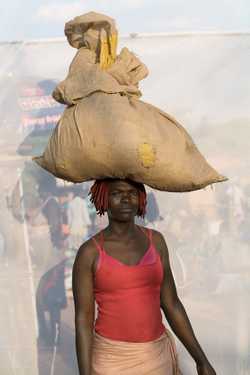
LAKICA BEATRICE: AGE 28 SELLING USED CLOTHES FOR 2 YEARS
[Interview Coming]
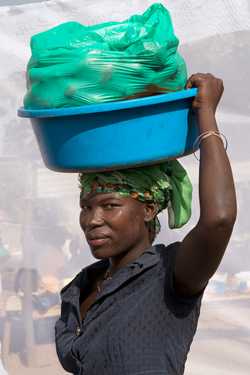
LAYENO EUNICE: AGE 38 SELLING AVOCADOS FOR 4 YEARS
[Interview Coming]
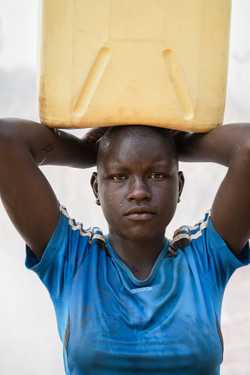
AKELLO SARAH: AGE 13 CARRIES A 5-GALLON JERRYCAN OF WATER THREE TIMES A DAY FOR HOME USE .
[Interview Coming]
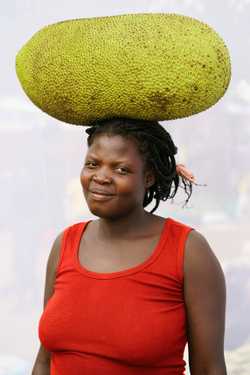
ADONG POSSY: AGE 27 SELLS JACK FRUIT FOR ONE YEAR FOR 500 UGX A SLICE
[Interview Coming]
ATIM SHARON: AGE 22 WITH HER DAUGHTER SELLING VEGETABLES FOR 3 YEARS
I am the last born of nine children. I was born in 1994. I studied up to Primary Six and then had to drop out of school because of a lack of school fees. I tried to study tailoring but dropped out after one year due to a lack of fees.
I am not married now but left the father of my two children because he used to drink a lot and we fought a lot. When I had had enough, I told my family that I wanted to leave and needed to start my life all over again.
They agreed because they had seen what I had gone through. I knew it wouldn’t be easy, but it was a chance I was willing to take.
I am now on my own; I am taking care of my children. I have sold kabalagala (Ugandan kind of pancakes) and nyoi (boiled maize and beans), and I now sell vegetables, which I consider a big change.
I have difficulty paying rent, but I am managing fine.
I hope one day, I will be able to buy and sell more vegetables, which I can’t afford at the moment, and then just be able to afford nice things for my children. That would make me happy.
ADELINE TUSHABE: AGE 29 VIDEO GAMES DESIGNER FOR 2 YEARS
I am a Video Game Developer with Oysters & Pearls Uganda. I design audio games for visually impaired persons and sighted people. I teach game design.
I have always had an interest in IT, but because I didn’t study math at A levels, that meant I would not be admitted to university to study IT. So, I opted for a Bachelor in Business Administration.
My dream for IT came true when I was hired to work with Oysters & Pearls. I feel that I have found what I wanted to do in my life. I can make an impact on people’s lives through game design.
I am creating my own path because there are no companies that employ software engineers to develop games in Uganda. My dream is to develop games that will be played by more than one million people, and when I get to that goal, I will want ten million people to play my games.
ABUR ELIZABETH: AGE 36 TRAINS VISUALLY IMPAIRED PEOPLE TO USE BRAILLE & COMPUTERS
I became blind at the age of fifteen. This is how I became blind; my eyes hurt for a while, and then I couldn’t see anymore. Whatever treatment I received did not revive my eyes. I couldn’t believe what was happening to me. Life became very hard for me. I had to learn to navigate my way around places I was familiar with.
I felt worthless. I did not see any reason to live anymore. I wanted to die. I started devising ways to kill myself, but each time a family member found the rope I wanted to hang myself with, and they would counsel me. I didn’t give up my plan. On the third attempt, my grandmother found the rope I had planned to hang myself with.
She counseled me, but what I remember most is, “even if you die now, people will say we are going to the funeral of the blind girl,” she said. This hit me real hard because now it seemed like even if I died, nothing much would change.
My grandmother was a born-again Christian at that time. She also said I wouldn’t see God if I committed suicide. I believe in God, and I couldn’t imagine a life without dreaming of seeing God one day.
Life continued to be hard for me, but I managed to attend blind schools and graduated in 2015, and I found a job at Oysters & Pearls Uganda, an NGO where I train visually impaired people how to use braille and computers.
I am married with four children. I also have another daughter, my niece, who is an orphan. Her father was killed in battle between Lord’s Resistance Army [LRA] rebels and Ugandan government soldiers. By then, my niece was three years old. My husband makes sweaters on contract in town, and sometimes he doesn’t earn much, so most of the time, I have to pay for everything for my family.
Life has never been easy for me. I struggle with boda-boda to cross the road to come here. Sometimes people help me cross the road; sometimes, they walk away silently when I ask for help.
I love music, some gospel and some not. I have written a number of songs, and when I get money, I hope to pay studio fees to record my music.
AMOO MARVIS: AGE 50 SELLING OKRA FOR 12 YEARS FOR 500UGX PER CUP
I am a mother of seven who sells vegetables in the market. I was born and raised in Lamwo District. We didn’t have much, but we had food, and we played as children. We seemed happy, maybe because we were not aware of what other people had or anything.
I studied up to Primary Three, and then my aunt, who lives in Kampala, came home and asked my parents that I go and live with her. She said she would pay my school fees and I would study in good schools. My parents were very happy, and they let me go with her. But when I got to Kampala, I was shown the kitchen and heaps of cloth. I never went to school. I only perfected skills in home management. Those days, there were no phones, and there was not much communication between my parents and my aunt. Her children are lawyers and doctors, and I sell vegetables at the market.
When I was eighteen, my aunt took me for Christmas with my parents. I was very excited because I knew I would tell my parents the truth. I told my mother what had happened, and she told my aunt that I wasn’t returning to Kampala with her. Instead, my aunt said we were ungrateful for her kindness.
By then, I was now much older, and I couldn’t go back to primary school. I met a man, and we got married, and we moved to Gulu in 2013. I have been selling vegetables ever since. This is where I get money to pay school fees for my children.
Right now, I am worried about school when it starts in January because I don’t have money to pay school fees. The children may stay home for a little longer, as I look for money for the school fees.
The buying capacity for most of the people has gone low because of the pandemic, so when the women from the Quarry don’t have money to buy from me, then I also don’t have much.
I would like to have a shop that sells a variety of things that people in this village need.
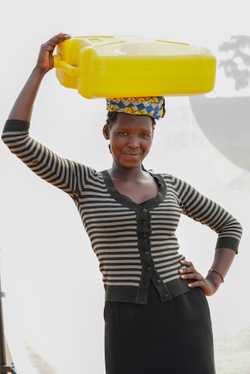
ADONG DAPHINE: AGE 20 STUDENT ATTENDING GULU UNIVERSITY FETCHING WATER FOR HOME USE
[Interview Coming]
SIMPROSA ACAYO OKOT: AGE 46 FOUNDER OF AMANI YA JU
I am a mother of three. I am always surrounded by fabrics with beautiful bold colors folded neatly on shelves. We get them from different places.
My father was a teacher, and my mother was a housewife. I have lived in different parts of the country because of my father’s work.
While I was in Sacred Heart School, I narrowly escaped being abducted by rebels. While I was at Gulu Teachers College, students were abducted, and some were killed. I am grateful that I survived all these atrocities while people I knew went through horrific experiences.
I found refuge in Nairobi. That is where I found Amani ya Juu, the organization that taught me how to make these beautiful crafts. I had to give up my job and return to Gulu, a place that I had been away from for ten years, to do what I do now.
I realized that women in Gulu needed more than relief aid. And I could do something that would help their lives.
It wasn’t easy at first, but I persisted with the business. I tailored more bags with different bright fabrics. I made small purses. I was always influenced by the good quality I learned from Nairobi, so I made sure that my products were of good quality.
I remember the time I stood under a tree in the rain with my products on my head. I cried so much nobody was buying. I didn’t see any progress in the work that I was putting so much into. There were women who were relying on me for their food, and I wasn’t fulfilling their dreams.
I saw a lady with a tree in front of her shop, and I asked her if I could display my products; she said yes if I would keep her company—something she needed. I displayed my wares on a tree. From a distance, people would see the products, and they would come, ask what was going on, and she would sell to them.
One day, one of my shoppers offered me another space and bought all my products. I began to have hope now that the future would be bright. And it was brighter. My products found their way to different places; Kabalega Diner, Amani Nairobi. More women joined the team, but some left because they found the work tedious after a few days. I wanted quality products that could be sold in New York and other international markets.
I hope to continue to train more women to sew bags, open a café, maybe have a restaurant that serves local food, and have land where the women can farm. My dreams for Amani are endless, and there are possibilities that all these dreams will come true.
AJOK PAULINE: AGE 35 SEAMSTRESS AT AMANI YA JU
LRA [Lord’s Resistance Army] rebels kidnapped me when I was fourteen years old on my way to school. That day, the rebels abducted mainly schoolchildren, and their aim was to take us to South Sudan. So, we swiftly walked into South Sudan, walking day and night.
I was abducted with my sister and six other girls. Two of the girls were killed along the way because they couldn’t walk fast. We later received a message from Joseph Kony, the leader of the rebels, that during this season, there should not be shedding of blood, but we were beaten and forced to carry heavy loads and hardly eat anything.
In South Sudan, everything was forceful. I was given to a man older than my father as my husband. We were beaten most of the time for almost nothing. I had a child with this man, but the child died, and the man also later died in battle.
I was given three months to mourn him and find another husband, but another man started saying that I had a relationship with him, which was against the law. He was beaten and killed.
I was ordered to be with another man. We had a child. But I faced so many problems in South Sudan, we hardly had food, and sometimes there was no water, and we had to survive on urine.
I started planning on escaping. I knew I couldn’t survive there anymore, and I wanted my son to know a better life. I escaped in 2002 with my son, and at that time, people were living in camps. I found out that my father had been killed. People used to call me names, and they made my life difficult, so I left with my son and studied tailoring at St Monica’s. Then I heard about Amani (a wholesale gift tailoring workshop in Gulu that trains women with HIV/AIDS and those that had been abducted by the LRA), and I came to work here.
I have now met another man, and we have three children.
My firstborn son has now completed Senior Six and now wants to study for a degree at university, but now I cannot afford university fees. He wants to be a lawyer. I hope that I can get money to buy for him his land so that he has a home of his own.
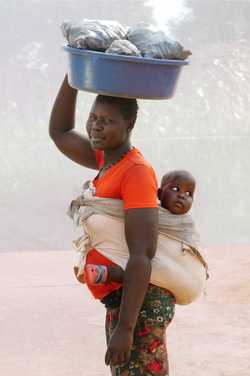
ALOYO JACKINE: AGE 26 & HER DAUGHTER BLESSINGS: AGE 2 SELLING CHARCOAL FOR 3 YEARS
[Interview Coming]
AKELLO CHARITY AGE 26 AUTO & BODA MECHANIC FOR 12 YEARS
I am a mechanic. My name is Charity Akello, and I am 26 years old. I repair boda-boda, generators, cars, mills, concrete mixtures, and anything that needs to be repaired.
My heart has always been keen on mechanics. By the time I completed primary school at twelve, I knew that’s what I wanted to do. I didn’t know any women mechanics, but in my heart, I knew that it was what I wanted to do. I asked my father to take me to mechanic school. I was the only girl among forty men. They were much older than me. They used to call me Nyara; I was their daughter. And I gave them the respect they deserved.
I asked them to show me how to repair this and that. They showed me, and that was all I needed to know. I worked hard. I completed on time, and then I created my clientele in Gulu Town. People know me here. I repair their boda-boda, generators, cars, mills, among others.
It’s not easy being a mechanic here. People say hurtful things, but I don’t listen much to what people say; when I want something, I find it, or I do it. This is my mantra.
At nineteen, I bought this land where my home stands, and I started a piggery project. I wanted something I could do when I wasn’t repairing things. Sometimes, I get hurt and don’t have an income, so this project helps me.
I want to train other women to become mechanics, but sometimes they come once, and they never return at all. I never know what goes wrong. I don’t know if this work is too hard for them. or they hate the smell of grease. This is the work that keeps me going. This is the work I always wanted to do.
JENNIFER SALLY AMONG: AGE 34 BODA-BODA DRIVER FOR 4 YEARS
You can find me at the Smiling Panda Stage.
I graduated with Bachelor in Arts with Guidance and Counselling from Kampala International University in 2009. I couldn’t find a job related to my profession. I love counseling and guidance, but without a job, I couldn’t love it anymore. I needed to find something that could bring me money.
I have two children that I have to feed and clothe and pay school fees. They also need medical attention every now and then. I needed to pay bills, so I started selling produce. With the little money I had, I would buy the produce when food was plentiful and sell when there was scarcity. I made some money. But then I got sick, and I used up all the money I had saved. I was back to worrying. There was no way around it; I needed to earn money.
There was a Boda-boda [motorcycle] sitting there in my house, looking at me every day. I knew how to ride it and could earn some money carrying people and their luggage. My father gave it to me during my graduation. I thought about doing a Boda business, but the thought scared me since I didn’t know about any Boda women. All I needed was some bravery, fuel, and money for service.
I gained some courage, influenced by my lack of money and my zeal to make money. I went to the office of the Gulu Boda Association to inquire about becoming a driver. The office was full of men. I told them what I wanted. They thought I wanted to hire a driver. When I corrected them, saying that I wanted to drive it myself, they all burst into laughter. I can still hear their laughter.
Eventually, they agreed. Most stages [motorcycle stands that await customers] didn’t want me, or their membership fee was too expensive for me. For instance, Gulu Main Market Stage [Boda stand] is one million shillings [$270] in fees, and I didn’t have that money. The men claimed I will spoil their relationships with their women. I told them I would follow the rules and regulations of the stage. They laughed. There was something in me that spelled danger, and I didn’t know it. I needed money, and I had to persist.
Smiling Panda Stage was different. The management accepted me; perhaps they knew I needed help. I borrowed 100,000 shillings [$27] to pay for the stage membership; I would pay the remaining 200,000 shillings [$52] later, when I got it. They accepted, and I had to work hard to get my customers. I was nice, I treated my customers well. I was punctual when they needed me. I reduced prices when I needed to. I gained many customers. The men I worked with call me, Aya – the only woman among men. I have accepted the name. It makes me work harder.
People have negative attitudes towards women Boda drivers. I have been harassed, but I ignore or tell people harshly to leave. Not to touch me.
I am Aya. I have to work harder than the people around me.
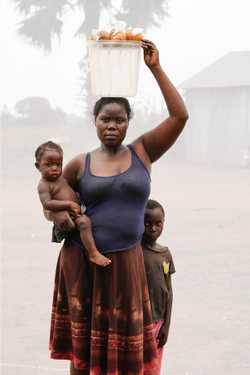
ALOYO NANCY: AGE 30 WITH HER CHILDREN JUNIOR: AGE 6 & ANGEL: AGE 12 MONTHS SELLING G-NUTS FOR 4 YEARS AT 1,000 UGX PER BAG
I am a 32-year-old mother of two children. I was married, but my husband is polygamous, and when his other wife returned to the home that I lived with him, I decided to leave with my children. I don’t want them not treated well by someone who doesn’t have their best interest.
My mother died when I was seventeen years old. I live with my aunt, who was hit by a landmine during the war. She is now disabled, and I must help her cope with her life. She makes mandazi, and she needs someone to hawk them for her, and I can do that very well.
My aunt is a single mother of two boys. They are not able to hawk the mandazi because they are boys, and I am a girl who can do it. I need a place to stay, and my aunt has offered that space for me, and I must do everything to help her.
I have epilepsy, and sometimes I get an attack, and so I must stand still for a while, and sometimes I am carrying a bucket of mandazi on my head. I was told that I got epilepsy from a woman who had it. She carried me when I was a baby, and they say you shouldn’t carry babies when you have epilepsy because you can transfer it to the child.
I want to have a salon so I can plait hair. I learned to plait hair from a friend who taught me. I hope that in the salon, I can sell my aunt’s mandazis because I can’t leave her to do it on her own.
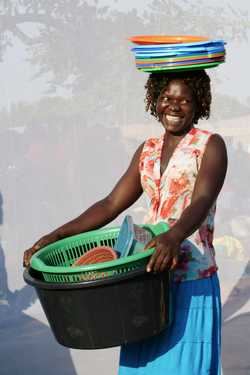
MUSOLO SUSAN; AGE 30 SELLS PLASTIC BUCKETS & UTENSILS FOR 5 YEARS
[Interview Coming]
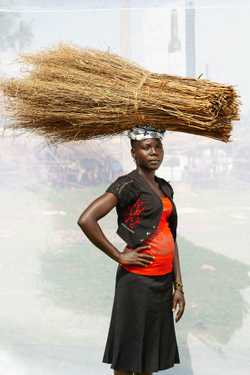
ATOO MARY: AGE 18 SELLING SOFT BROOMS FOR 2 YEARS FOR 1,000UGX PER BROOM
[Interview Coming]
ANDELA CHRISTINE: AGE 43 FARM FISHING ON THE NILE RIVER FOR TWO YEARS
I live in Mpumudde in Jinja with my five children. My husband died in 2015. We had been married since 1996. I will not remarry. I am happy as I am. I would like to take good care of my children and my one grandchild, who is one year old.
I dropped out of Primary Seven due to a lack of school fees. I know the importance of education; that is why I want my children to get all the education they can get. I am sure that if I got more education, I would be able to do more in life. It would have been my bridge to many things that I am unable to achieve now.
My dream is to visit my friends and family in Kenya for a short time, then come back, settle down and take care of my children.
I love this work in fishing, and I hope I can be better at it and be able to earn money that I have never earned in my life. There seem to be opportunities here. I am going to learn whatever I can and do whatever I can to get better and better at it.
I hope that one of my children will become a doctor so that s/he can cure me of my back and knee problems that have constantly forced me to need medical attention.
KINDHA MWAJUBA: AGE 48 FARMING FOR 20 YEARS
I have been farming for more than twenty years. I mainly farm maize and groundnuts for family consumption. We sell when we have extra food. These days the weather is unpredictable, so some years I get good yields, and then sometimes it’s really bad.
I also keep chicken, but that is more expensive in terms of feeds for the chicken, and it requires a lot of time.
I keep bulls, and to make this easy for my family, I plant elephant grass for the animals to feed on. The leftovers of the groundnuts are also animal feeds.
I have six children and five grandchildren. I take care of all of them. My best moments are when we sit and relax and have conversation while drinking soda and maybe eating chapati.
The farm work is tedious, and my dream work is a mobile money business so that I don’t have to do much physical work.
ZIRIYA MUSIBIKA: AGE 50 RAISES BULLS & CHICKENS
I never went to school because my father had many children, and he didn’t have money to pay school fees for all of us. I wanted to study, but I couldn’t, so I put so much energy into trying to get my children to study. I work hard to get their school fees.
I never went to school because my father had many children, and he didn’t have money to pay school fees for all of us. I wanted to study, but I couldn’t, so I put so much energy into trying to get my children to study. I work hard to get their school fees.
Right now, I am raising bulls, and then I will sell later. I buy a bull at 400,000 shillings [$108], then twelve months later, I sell at one million five hundred thousand shillings [$432]. I use the profit to pay school fees, buy some food, and buy clothes.
I also keep chicken. I have been doing this for years, but this requires a lot of work, but I do it anyway.
I love to spend time with my children; laughing and chatting with them makes me appreciate life. It gives me so much happiness.
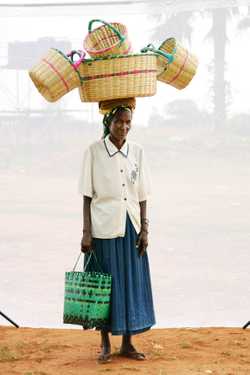
ANTEKO CHRISTINE: AGE 50 SELLING LOCAL WOVEN BASKETS FOR 20 YEARS
[Interview Coming]
BABULA CLEMENTINA: AGE 58 MIDWIFE FOR 43 YEARS DELIVERING AN AVERAGE OF 100 BABIES PER MONTH
Both my grandmothers before me were birth attendants. I learned from them as they did their work. I saw them help many women give birth, and I wanted to help like they did.
At sixteen, I helped a mother deliver her baby. I was excited and nervous, but I did like I saw my grandmothers do. The baby has now grown. She comes around to say hello.
After completing senior one, I joined a nursing school so that I could learn basic safe delivery skills. This added more information and skills to what I had. I learned names of things I didn’t know.
Two of my daughters are now professional nurses. I am sure they got interested because of the work I do. They help me whenever they come home. They advise and guide me.
Most of the people in the village know me. I have helped many of them. Some people wonder why people come to me instead of the hospital; the women say the hospitals are expensive and that they treat them badly. Here I treat the women well. I accept whatever amount of money they have or anything they bring. Sometimes they promise to bring more. Sometimes they never do, but I continue to help anyway. I have to save lives first.
I get herbs from the bushes around home to help ease the pain and birth for the women. I prepare for them tea to give them strength. I don’t give them sodas because it makes them bleed a lot. I bury the umbilical cord in the pit I have dug for that purpose.
Sometimes the women don’t even say thank you. They even take my stuff like blankets and baby clothes without permission, and I have to buy new ones.
Before we had cellphones and Boda-boda (motorcycles), I would walk in the village to help women deliver. I also had a network of people, and words would spread through one person to the other.
Now, I get women coming in from all over the country, and I don’t know how they know about me. I help deliver about one hundred babies per month in my cottage. It’s been like that for a long time.
ACAYO MARGARET: AGE 59 NURSE & HEALER FOR 35 YEARS
I am a retired principal nursing officer. I retired two years ago. I mainly worked in military hospitals around the country.
I have one daughter and four grandchildren, but I take care of ten children whose school fees I pay. They are my nieces, nephews, and cousin’s children. Of course, my pension is not enough to pay to cover all my costs, so I do a farm as well. There are vegetables around my home which we eat so that I don’t spend much on food.
As a retired nurse, I have opened a clinic to provide medical assistance in this village. I was inspired by my father, who also provided health services to this village. He used to treat people from home. And I would help him, and I admired the work he did. I treat common illnesses here, for example, the common cold, malaria, and pains. I sell my medicine cheaply because I am aware that many people cannot afford to buy medicine. Many of them sometimes can’t even afford full dozes to treat their children.
They come here any time, sometimes in the night, and I advise them accordingly and try to help them deal with whatever emergency they are dealing with. Sometimes people want credit, and they fail to pay the rest of the money.
There is a Health Centre II, which provides free health services, but most times, they don’t have drugs, so people have to find alternative health services.
My dreams are to have a laboratory so that I am able to test diseases and hire people to assist me to do my work.
ADUK SARAH: AGE 58 BREWING WARAGI FOR 50 YEARS
I started brewing waragi at the age of eight. My mother died, and I had to work hard at an early age. I stopped going to school, but I know how to write my name and how to count money.
My husband used to drink alcohol at our home, and that’s how I met him. We have three children whose school fees I have been able to pay because of brewing alcohol. I sell it at home, and everyone in Alokolum comes to buy and drink from here – under the mango tree.
I have now brewed for fifty years. And it’s the best thing I know how to do.
My drinking is not considered drinking because I only taste for my customers whether they will like it, and they always do.
OBOLO KEVIN (AGE 38) SELLING SHOES FOR 10 YEARS.
I am a mother of two. I used to brew waragi, and when I got 50,000 shillings, I joined a savings group, and after saving for a while, I got a loan. I used the loan to pay my children’s school fees, and with the rest of it, I started the shoe business.
I travel to different markets to sell shoes on a daily basis. On a good day, I sell shoes worth 200,000 shillings, and on a bad day, 100,000 shillings. With that money, I am able to pay school fees for my children. I am also a farmer. When I am not in the market, I am home planting crops that I sell to help me raise my children.
One of my major challenges is that I don’t have a place to store the shoes. I have to keep them at my home. And rain affects my work so much, sometimes I get rained on, and I can’t sell much since people don’t come to the market. And people bargain so much and sometimes I feel sorry for them so I sell the shoes much lower than I should.
I love sports. I am a footballer, and I also play netball. If there were opportunities, I would like to play further, maybe in the national team. Playing football is my happiest moment.
My dream is to have my own shop where I could sell different types of shoes and not have to risk my life traveling all the time.
ADONG AGNES (AGE 27) MANAGER OF LAYIBI MARKET FOR THREE YEARS
I was raised by my stepmother. She wasn’t the evil stepmother that most people have. She made sure my school fees were paid, and I studied well. I completed my diploma in accountancy in 2015, and since then, I have been working at Layibi Market as the general manager. I deal with the welfare of the vendors, any disciplinary issues, and mainly collect market dues.
One of the major issues of dealing with the market is witchcraft. Some of the women have evil powers that destroy another vendor’s produce. For instance, a witch may dry up vegetables of another vendor’s for whatever reason for weeks. It’s my duty to resolve that conflict, and sometimes such a vendor is asked to leave the market.
I usually pray before I go to the market because I never know what is awaiting me. Sometimes, I wish I could get another job so that I could leave this position, but I am glad that I am able to help the vendors.
I wish the women could pay off their loans and then survive without borrowing loans because this means they have to live hand to mouth, and sometimes their properties are confiscated because of failure to pay loans.
We always teach the vendors about the love of God so that they can leave witchcraft, but it’s hard; you never know what they are thinking.
OCWEE PAMELA: AGE 31 SELLS VEGETABLES AT LAYIBI MARKET
I am a mother of six, and we live in Go Down, Layibi. The father of my children is a farmer, he sells produce, and most of what he harvests is for home consumption, and sometimes I sell some in this market.
When I was ten years, I was abducted by Lord’s Resistance Army [LRA] rebels. I escaped after one week. From the moment I was abducted, I started planning my escape. I had heard stories of other people escaping, so I knew it was possible to escape. I also knew that if I tried and they caught me, I would get killed, and I was still willing to try.
The moment came when there were gunshots, and people were running in different directions. I run and run until I found a family that hid me for a while then helped me get home. This experience has toughened me, and this makes me know that as long as I don’t hear any gunshots, life will be better.
I find difficulty in paying school fees for my children, but I know that if I get more food to sell, then I will get more money then, I will comfortably pay school fees for my children. I will always try to make my life and my children’s lives much better. I will work as much as I can.
I enjoy my life and my best moments are when I sit with my children, drinking soda or tea, and we tell stories or just talk. I relax. I appreciate my children. I wish life was much better and I didn’t have to work so hard to get little money to run my family.
ACAN ROSE: AGE 51 SELLS VEGETABLES AT LAYIBI MARKET FOR THREE YEARS
I was raised by my grandmother, who was too old to pay my school fees. My elder sister took on the responsibility of paying my school fees, but I had to drop out of primary school because my sister started expanding her family, and she had to take care of them. She could no longer afford to pay my school fees. I was disappointed, but I knew that there was nothing I could do about it.
At sixteen, I got married in 1985, and I started having children soon after. When my husband died in 2018, we had five children, including twins.
I hope that my children will have a better life than me because I am taking good care of them. I do whatever I can so that they get a better education. I have done all sorts of businesses to earn some money; I have sold fish, sold clothes, and now vegetables.
It’s also good that they have me around to mother them. I never had a mother to baby me, so I had to mature really fast. I am happy that I am there for my children since I didn’t have a mother around me.
My dream is to have my own shop with lots of foodstuffs to sell to my customers.
ADONG SUNDAY: AGE 24 SELLING POTS & PANS FOR 4 YEARS
At 17 years, I sold avocados for two months and raised 270,000 shillings. I wasn't sure which business to do so I asked my mother for advice. 'Sell sigiri,' she said, and that is the business I decided to do – to sell charcoal stoves. I did a bit well. I raised more money, and this year, I started selling other things like cups, plates, saucepans, flasks, cutlery, among others.
I am still doing the sigiri business, but this time I have more market. I send some by bus to different locations. The sigiris go for 10,000 to 25,000 shillings.
One of my major challenges is the rain; during the rainy season, I have to gather my merchandise and find space so that they are not destroyed. This is not easy, but I must do it every now and then.
Another problem I have is this sewerage system in the market. It smells especially when the sun is very hot, and during the rainy season, it bursts, and I have to continuously ignore it, but I know that this affects me.
When I was in senior three, I conceived, and I worried about my family's reactions. My family saw to it that I had my baby, and soon after, I went back to school, but when I reached senior four, my father said he couldn't afford to pay my school fees anymore. I was sad, but there was nothing much I could do.
I have always wanted to be a doctor; as soon as I get enough money, I will go back to school. I hope I will eventually become a doctor. That's my mission.
APIO AGNES: AGE 27 DRESS MAKER FOR 8 YEARS
I studied up to Primary Seven, then had to drop out of school due to lack of school fees. Then, I studied tailoring at St Monica. When I completed it, I did my tailoring at home. It was difficult because I only did work for friends and family.
I saved that money and found space on the veranda where I could now tailor for more people. The rent for this space is 100,000 shillings [US$27]. People who came to the market could easily see me, and I began to have more work and more money. I have bought more fabrics, so my customers have a variety of fabrics to choose from. I wear dresses I have made so that many people can ask me who made them, and I tell them; then they ask me to make the dress for them.
I am now training my niece, Adong Gloria, who I have been taking care of since I was twelve, and she was five years after my sister passed away. She was my protector, and sometimes she acted as my mother, and I thought it was right for me to take care of her daughter after her death.
Each morning, we leave home and come to this veranda and work till evening, when my three children join me, and we go home.
My dream is to have my own shop. Working from a veranda is not easy, especially during the rainy season. When I have my own shop, I would like to get more beautiful fabrics all around me and make clothes for many people.
ATIM GRACE: AGE 41 SELLING DRY FISH FOR 16 YEARS
I was abducted by Lord Resistant Army rebels when I was thirteen years old. I spent one month and three months in captivity. I was saved by government soldiers who were chasing after the rebels, and I was carrying a heavy load. I had swollen feet because we had walked a very long distance. I was so relieved that after I returned, I made sure I never got abducted again. I saw things I don’t think I was ready to see at the age of thirteen.
The rebels were inhuman. They killed so many people and made me carry luggage that exhausted my body and still expected me to walk. I still get nightmares from my experiences. I hope none of my children goes through such a life.
I dropped out of Primary Seven because I was much older than the rest of the children, who were about eleven or twelve, and there I was at fourteen. The children would call me names. They would bully me, so I thought it was much better not to continue with my education, but I am glad I know how to read and count money.
I would have loved to become a nurse. I admire the work they do, saving people’s lives. I would have been a beautiful nurse, wearing those blue dresses with a cap on my head. For now, I have to sell fish in the market. I am not sure there is any work out there for me.
I got married when I was seventeen years old, but my husband was sick frequently. It took me long to know that he had AIDS and that I had it too. I am now on medication, and three of my children are HIV positive, but the younger ones are not because I went to hospital and followed the instructions. He died and left me when I was pregnant with my last born. He is now three and a half years, and he doesn’t have HIV.
My biggest challenge is paying bank loans and school fees for my children. I will be a happy woman when I don’t have to pay any loans and just focus on paying school fees for my children. I will be a happy woman.
BIO: BEATRICE LAMWAKA
Beatrice Lamwaka is an independent journalist, writer, researcher, literary activist, mentor, and editor. Born and raised in Gulu, Uganda, she was shortlisted for the 2015 Morland Writing Scholarship and in 2011 for the Caine Prize for her short story, “Butterfly Dreams,” which was later published as a book of short fiction.
Lamwaka has worked with an international humanitarian agency in Italy and Sudan. She is also the Vice President of PEN Uganda Chapter and has served on the Executive Board of the Uganda Women Writers Association (FEMRITE). A recipient of numerous awards and grants, including as a Finalist for the PEN/Studzinski Literary Award, she has been a Fellow at Stiftung Kunsteldorf Schoppingen (Germany). Lamwaka has been a writer in residence at the Rockefeller Foundation’s Bellagio Center(Italy), Chateau de Lavingny International Writers’ Residence (Switzerland), Femrite’s Regional Writers’ Residences (Jinja, Kampala, and Entebbe), Caine Prize writer’s workshops (Cameroon and South Africa), and Miles Morland Foundation’s workshop in Zanzibar (Tanzania).
Her short stories and poetry have been published in numerous anthologies, including To See the Mountain and Other Stories and African Violet and Other Stories. In 2019, she was a contributor to New Daughters of Africa, edited by Margaret Busby.

